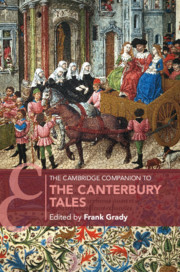Book contents
- The Cambridge Companion to The Canterbury Tales
- The Cambridge Companion to The Canterbury Tales
- Copyright page
- Contents
- Illustrations
- Contributors
- Preface
- Note on the Text
- Chronology
- Abbreviations
- 1 The Form of the Canterbury Tales
- 2 Manuscripts, Scribes, Circulation
- 3 The General Prologue
- 4 The Knight’s Tale and the Estrangements of Form
- 5 The Miller’s Tale and the Art of Solaas
- 6 The Man of Law’s Tale
- 7 The Wife of Bath’s Prologue and Tale
- 8 The Friar’s Tale and TheSummoner’s Tale in Word and Deed
- 9 Griselda and the Problem of the Human in The Clerk’s Tale
- 10 The Franklin’s Symptomatic Sursanure
- 11 The Pardoner and His Tale
- 12 The Prioress’s Tale
- 13 The Nun’s Priest’s Tale
- 14 Moral Chaucer
- 15 Chaucer’s Sense of an Ending
- 16 Postscript: How to Talk about Chaucer with Your Friends and Colleagues
- Reading Chaucer: Easier than You Think?
- Scholarship or Distraction? New Forums for Talking about Chaucer
- Talking about Chaucer with School Teachers
- Who Will Pay?
- Further Reading
- Index
- Cambridge Companions to …
Talking about Chaucer with School Teachers
from 16 - Postscript: How to Talk about Chaucer with Your Friends and Colleagues
Published online by Cambridge University Press: 21 August 2020
- The Cambridge Companion to The Canterbury Tales
- The Cambridge Companion to The Canterbury Tales
- Copyright page
- Contents
- Illustrations
- Contributors
- Preface
- Note on the Text
- Chronology
- Abbreviations
- 1 The Form of the Canterbury Tales
- 2 Manuscripts, Scribes, Circulation
- 3 The General Prologue
- 4 The Knight’s Tale and the Estrangements of Form
- 5 The Miller’s Tale and the Art of Solaas
- 6 The Man of Law’s Tale
- 7 The Wife of Bath’s Prologue and Tale
- 8 The Friar’s Tale and TheSummoner’s Tale in Word and Deed
- 9 Griselda and the Problem of the Human in The Clerk’s Tale
- 10 The Franklin’s Symptomatic Sursanure
- 11 The Pardoner and His Tale
- 12 The Prioress’s Tale
- 13 The Nun’s Priest’s Tale
- 14 Moral Chaucer
- 15 Chaucer’s Sense of an Ending
- 16 Postscript: How to Talk about Chaucer with Your Friends and Colleagues
- Reading Chaucer: Easier than You Think?
- Scholarship or Distraction? New Forums for Talking about Chaucer
- Talking about Chaucer with School Teachers
- Who Will Pay?
- Further Reading
- Index
- Cambridge Companions to …
Summary
What should we do about the fact that reading Chaucer is hard? The “immersion theory” of learning Middle English, rooted in nineteenth-century philological approaches, is no longer really functional or well-suited to attract our wider and more diverse contemporary audience of students; we might return, productively if paradoxically, to an earlier appreciation of textual difficulty (and reward), which we actually share with our Modernist colleagues. In this we can make translations our allies rather than our antagonists. Moreover, the stereotypes about the Middle Ages that we have traditionally railed against, from “dark-ages” dismissals to pre-Raphaelite romanticizations, may no longer be the ones our twenty-first-century students carry with them these days.
- Type
- Chapter
- Information
- The Cambridge Companion to The Canterbury Tales , pp. 244 - 249Publisher: Cambridge University PressPrint publication year: 2020

